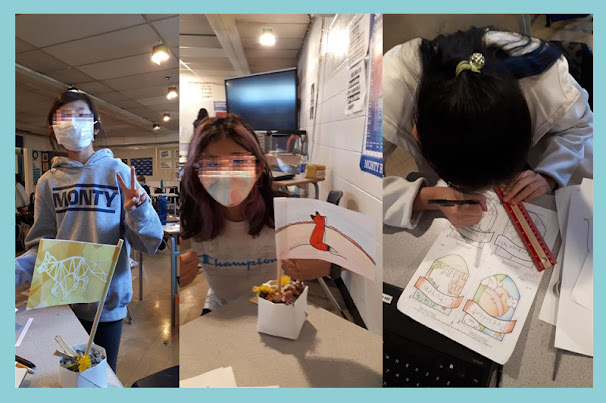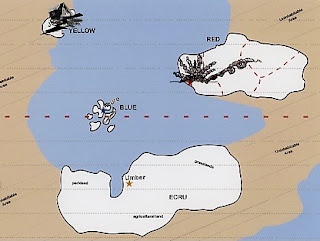Orbit 2 Lesson 5 - Students grapple with chaos, evacuations and loss
Orbit 1 ended with a cliffhanger -Because they were unable to look ahead, the students received the information of the catastrophe at the same time and collectively reacted to the catastrophe. It was a great teaching opportunity on many levels. On their own, some students chose to research meteorites after school hours. They spent time sorting out facts and checking for fiction.
Lesson 5 - A meteorite destroys Red's Capital causing chaos, evacuations and loss. Students read the newsflash, digest the information and spring into action.
Students took a moment to come to terms with the resounding impact of catastrophe. There was much chatter and I helped as they attempted to articulate in French. Citizens of each country grappled with 'How did this happen?' and 'What happens next?' Vocabulary generated from the newsflash helped students express how the lives of those who were directly impacted had changed.
The short assignments following the newsflash worked well to keep students emotionally engaged.
Simulation Tips:
- Each country found their own way of choosing a leader and advisor. It is most important for students to be in control of decision making within obvious boundaries.
Having carefully picked the students in each group was key to having an effective mix of strengths and skills.
Having language codes for each country works well. Codes help define each country while offering a puzzle-like activity. Students spent time considering their code-written, empathetic notes: For the messages back and forth between the countries to express support for Red’s plight, writing messages in the country’s language (code) was fun. After having had a Q/A free-for-all in the common tongue (French) in the Orbit 1 conference, the concept of carefully crafting an official communiqué on behalf of the country was a different matter.
- For Simulations to encourage critical thinking, they must be open-ended and allow students to consider the implications of an event. When the situation feels real, students will engage and interact.
- The Reddean citizens spent quite a bit of time researching, reflecting and discussing their predicament: impact damage from the asteroid, the effects of cholera, how to plan for the short/medium/long term survival and rebuilding.
- Yellowites were quite concerned about how to help the refugees feel welcome and safe, and were already speaking to the need for all countries to work together to restore a healthy environment.




Comments
Post a Comment